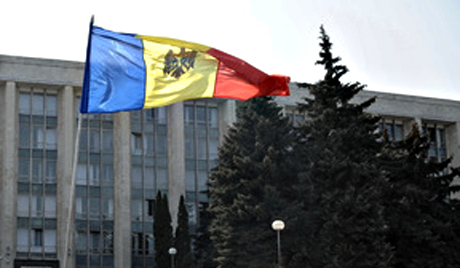
Moldova’s Alliance For European Integration: a Team of Rival Parties
Publication: Eurasia Daily Monitor Volume: 8 Issue: 5
By:

Moldova can finally regain political stability after two years of constitutional crisis, incessant parliamentary and presidential elections, unstable governance, and institutional vacancies. Following the November 28, 2010 parliamentary elections (EDM, November 29), the new parliament convened on December 28 and reconstituted the Alliance for European Integration (AEI) as a governing majority on December 30 (Moldpres, December 28-31, 2010; Timpul, January 3-5, 2011). The AEI has governed since September 2009 with a narrow majority and despite constant infighting among AEI’s own component parties.
The Communist Party, in power from 2001 to 2009, continues to hold the largest electoral base; but the party’s pluralities are slowly and inexorably declining from one election to the next. AEI’s three parties now hold 59 parliamentary seats, to the communists’ 42. The changing correlation of forces may finally open the way to a deal between the two camps in the newly elected parliament. Such a deal would have to include electing AEI’s nominee as head of state and revising the constitution of this dysfunctional parliamentary republic, as minimal requirements for political stabilization.
The new parliament is Moldova’s fourth legislature within two years. The AEI’s three parties now hold a more comfortable majority of 59 out of 101 parliamentary seats, including: the center-right Liberal-Democrat Party of the acting prime minister, Vlad Filat, 32 seats; the left-centrist Democratic Party of presidential aspirant, Marian Lupu, 15 seats; and the right-wing Liberal Party of Mihai Ghimpu, who doubled until now as chairman of parliament and acting head of state, with 12 seats in the new parliament. The Communist Party of former President (2001-2009), Vladimir Voronin, remains the single largest by far, with 42 seats in the 101-seat chamber. The communist label and both liberal labels are merely nominal, bearing no relation to doctrines or programs.
Filat’s Liberal-Democrat Party is demonstrating the strongest growth by far. It doubled its score in these elections, thanks to Filat’s talent at accumulating administrative resources and deal-making with interest groups during his short time as prime minister. Filat also absorbed some organizations and voter groups from smaller parties, including voters of Ghimpu’s Liberal Party. The latter shrank in these elections, even as Ghimpu held the parliament’s chairmanship and interim state presidency, with his nephew, Dorin Chirtoaca, in the post of Chisinau mayor. Their party lost heavily among Chisinau’s voters. Lupu’s Democratic Party grew slightly in these elections, at the expense of the communists and of small leftist parties.
All four parliamentary parties are leader-oriented and strongly disciplined. The Communist Party nevertheless accepts some quasi-factions (three can be identified), it holds some formal internal debates, and communicates door-to-door with the grassroots (a hallmark of this party). AEI’s parties act, each, monolithically. Their respective top leaders hand down their decisions, rarely consulting with the second echelons. Although they had denounced Voronin’s “vertical of power” during his presidency, each AEI party operates its own “power vertical” internally.
The AEI has not made any significant inroads into the Russian/Russian-speaking population. This comprises nearly 20 percent of right-bank Moldovan voters and accounts for half the communist electorate. The Democratic Party tried to make inroads there, with minimal gains. The Communist Party’s loss of power, however, will soon open a contest for inheriting its large electorate.
Currently, however, AEI’s parties seek to grow at each other’s expense, in a zero-sum competition for overlapping blocs of Moldovan/Romanian-speaking voters. In a parallel process, the Romanian-minded Liberal Party absorbed the Christian-Democrat People’s Party’s electorate, after that party had abandoned the Romanian national ideology. Following the Liberals’ defeat in Chisinau, mayor Chirtoaca called for “consolidating our electorate” through an „incisive, principled approach “to national history and identity (Unimedia, January 3).
Apart from redistribution of parliamentary seats, the most notable trend is the ascendancy of major businessmen in the Democratic and Liberal-Democrat parties. Not coincidentally, these two parties are the only ones growing. Financial oligarchs, albeit Moldovan-sized ones, have now become a feature of this country’s politics. Filat, himself among the top businessmen in the country, has recently co-opted a few other financiers, including former president Petru Lucinschi’s son, Chiril. The Democratic Party, funded by the tycoon, Vlad Plahotniuc, since its inception in 2009, has five wealthy businessmen among its 15 deputies in the new parliament.
Post-election negotiations on power-sharing among AEI’s parties took more than a month, until the final day legally permissible for registering a parliamentary majority. Under the coalition agreement, Filat’s party has made significant concessions to the smaller partners in the allocation of government posts. The agreed principle of government-formation is “continuity,” both in personnel and in the power-balance among the three parties, notwithstanding Filat party’s massive electoral gains (Moldpres, December 31, 2010, January 3-5, 2011).
Under the constitution, and in accordance with the coalition agreement, Lupu has been elected chairman of parliament, filling in temporarily as head of state. Lupu’s number two in the Democratic Party, Plahotniuc, is the new first-vice-chairman of parliament. This highly unusual decision reflects AEI’s internal agreement to move Lupu from the parliament’s chair to the state presidency as soon as possible. The chairman’s election requires a simple majority, but the state president’s election necessitates at least 61 votes, and the coalition is two votes short of that minimum. The AEI had originally agreed to elect Lupu as head of state in the fall of 2009; but it fell short, both of votes and of will to do so at that time, prolonging the crisis. In the background, tensions had developed between Filat’s initial presidential aspirations and Lupu’s more recently declared ones. This situation awaits a conclusive solution.
The AEI can govern with a simple majority but cannot elect a head of state, nor revise the constitution in this parliament, unless making a deal with the Communist Party or some of its deputies. Failing this, the new parliament would have to be either bypassed through a referendum of dubious constitutional validity, or dissolved again (as the existing constitution requires) if the parliament fails to elect the head of state.
The political system is not quite as starkly polarized as it outwardly looks and sounds. Lupu (or the tandem of Lupu and Plahotniuc) is positioned as a possible arbiter, or balance-holder, between the AEI and the Communist Party. The communists boycotted the session that elected Lupu as chairman of parliament and virtual head of state, but they did not oppose that election outright. Their decision suggests that the party is reserving its options for possible bargains. Indeed, Lupu’s team held parallel negotiations throughout December with Voronin’s communist team, for a possible center-left coalition. The arithmetic of this parliament will necessitate cross-isle bargaining to overcome the constitutional deadlock.




